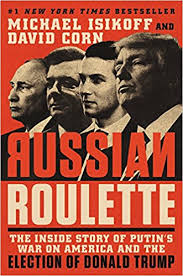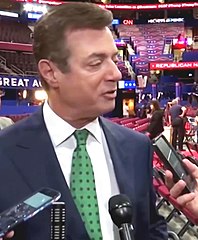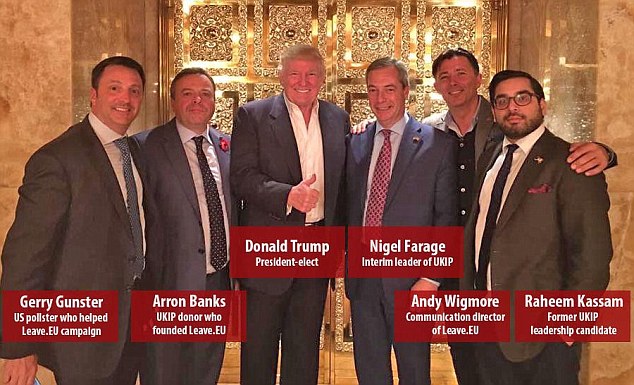
Russia in the Trump Election: Putting "Collusion" in Context
Full database of sources on the Trump Election | Database entries on Russian intervention
For almost two years now, Russian intervention has been the highest-profile, most actively debated factor in the convergence of factors that led to the Trump electoral win. But this nonstop media spotlight has often produced more heat than light, with endless repetition of back-and-forth assertions of "no collusion" versus "collusion." Many critics rightly note that talk about Russia has drowned out needed discussion of the many domestic influences that contributed to Trump's victory.
Nevertheless, it would be a mistake to ignore the documented realities and real impact of Russian "active measures." There is abundant evidence already in the public domain – particularly in the indictments of 12 Russian intelligence agents by Robert Mueller's team of prosecutors – with more likely to be revealed by the ongoing Mueller investigation. It is also essential to find new paradigms for understanding the Trump-Putin connection, which goes beyond personalities to new structural alliances at the global level featuring the intersection of right-wing politics, kleptocracy, and racism.
This short essay, part of a series on different explanations for the Trump victory and their implications, does not argue that Russian intervention was the decisive factor. But it was indeed among the factors that tipped the balance, and considering it in context rather than in isolation is important for understanding both past events and the future trajectory of U.S. politics.
Collusion in context: What happened
Although U.S. intelligence officials and the Obama administration were slow to realize what was happening, Russian intervention to assist the Trump campaign (see timeline) was systematic from the start of the campaign in mid-2015. Signs of it were noted by the Clinton campaign and by some government and independent analysts long before the election. The country's main intelligence agencies reached a consensus on the seriousness of the attack in the months before the vote, culminating in a joint report after the election. In 2018, detailed confirmation of selected aspects has been emerging in successive indictments by the Mueller investigation.

The best summary of both the intervention itself and the gradual emergence of evidence is the book Russian Roulette, by investigative journalists Michael Isikoff and David Corn, covering the period through 2017. (See a mini-review of the book I posted on Facebook after reading it in August 2018.)
The main elements of that intervention included two that are by now well documented: (1) hacking of Democratic Party emails and their strategic weaponization in the presidential campaign, and (2) promotion of anti-Clinton messages through official Russian publications and disguised social media operations, most systematically through Facebook and Twitter. It may also have included other measures such as direct financial support, as yet only hinted at in media accounts.
Those who doubt or seek to deny the evidence of Russian interference often focus on the motives of those advancing the claims – first the Clinton campaign, then the intelligence community, and now the Mueller investigation. But they are just the most prominent messengers. The evidence is overwhelming and should be recognized as such.
There is still uncertainty about the legal outcome and whether the evidence rises to the level necessary to prove conspiracy (the legal term). [For a short video statement on the legal issue by Senator Chris Coons, see https://www.youtube.com/watch?v=erpkqoR698E. But there is no doubt that publicly available information shows collusion in the general sense of the word – as de facto coordination of actions toward a common goal. This is visible in explicit statements by both President Trump and President Putin and in the timing and parallelism of their public messaging. What is as yet not visible is the full range of private communications and communication channels.
Collusion in context: Why and how it matters
The most significant and unresolved debate is not whether there was Russian intervention and collusion with the Trump campaign, but why and how it matters: that is, how much weight it had in the electoral outcome, on the one hand, and what its relevance may be for the future of Trump, his administration, and U.S. politics and society more generally.
In terms of its impact on the election outcome, Russian intervention was only one of many factors, and it probably had less impact than most of the other factors (see "10 Ways to Misunderstand the Trump Election"). It was certainly less significant than the cumulative impact of the domestic factors, from voter suppression to white racism to the actions of the rival presidential candidates and their campaigns.
In terms of thinking about the future, whether the immediate challenge of the 2018 midterms or the more profound structural issues of racism, inequality, and failures of democratic institutions, the domestic issues must be front and center. In terms of electoral strategy as well as continued mobilization, Democratic politicians and progressive activists are well advised to limit their attention to the latest twists and turns of the Russia scandal and to avoid rhetoric that builds on anti-Russian sentiment.
Nevertheless, it would be a mistake to underestimate the strategic significance of the outcome of the Mueller investigation and continued investigative reporting. This is in part because of the potential for further legal action and eventually impeachment. But more broadly, further revelations from Mueller may accelerate the erosion of support for the Republican party among centrists who value truth and the rule of law or among swing voters for whom this may be "the last straw" that moves them to finally repudiate Trump. While Trump's base will not disappear, new revelations and court cases will be among the factors determining whether and to what extent its numbers and organizational strength are diminished.
Cold War and geopolitics: Dominant but limited paradigms
Given the superpower rivalry between the United States and the Soviet Union from the end of World War II until the early 1990s, it is predictable that Russian intervention in 2016 has been seen as part of a "new Cold War." But this is a flawed analogy. The United States and Russia are nuclear powers and geopolitical rivals, and conflicting policies in Eastern Europe in particular evoke Cold War parallels. But the Russian state has long since abandoned any pretense of left-wing social and economic ideals in its ideology and practice, whether domestic or foreign. And the "liberal democratic order" over which the United States presided during the Cold War never stood for freedom except for a select few, based as it was on colonial domination and a world order tilted to benefit rich countries.
Indeed, US concerns about Russian intervention in its elections appear hypocritical in light of the history of interventions in other countries' elections by the United States and other Western powers during the Cold War. More broadly, foreign intervention by rival states is common across ideological barriers whenever those powers have the capacity to do so. It is practiced by allies as well as adversaries, as with the notable cases of influence efforts in U.S. politics by Israel, Saudi Arabia, and other Middle Eastern states.
The split between Trump and intelligence professionals (whom Trump and his followers label the "deep state") over Russian intervention is real. But while the Cold War was arguably formative in the careers of senior intelligence officials, their views regarding the current Russian intervention may be less based on blind opposition to Russia than it might appear. Reading the recent memoirs of former security officials such as Michael Hayden, James Clapper, and James Comey, one finds not only the expected conservative views and a blind eye to past U.S. human rights abuses at home and abroad, but also the horror of professional civil servants at the indifference of the Trump team to facts and decision-making based on intelligence. In addition, they share a visceral reaction to Trump's open racism and bigotry, which they reject based on their experience in the armed forces or law enforcement. And unlike much public commentary, their evaluation of Russian action appears to be based more on evidence than on anti-Russian sentiment.
It is notable that Trump's efforts at rapprochement with Putin have rarely been implemented by his officials, and that even Republican members of Congress have voted against him in imposing sanctions on Russia. Such internal opposition is far less effective in curbing the domestic far-right agenda shared by Trump and others in the Republican Party. But the split between Trump and traditional patriots may widen as the Mueller probe accelerates. It may be decisive if and when a real constitutional crisis tests the loyalty of the armed forces and law enforcement agencies, since evidence of foreign connections may have its greatest weight precisely in those key constituencies.
Another context: Kleptocracy, fossil fuels, and racism
During the Cold War, its bipolar paradigm clearly influenced many events. But progressive social movements repeatedly challenged its hegemony, arguing that neither the United States nor the Soviet Union was a consistent promoter of freedom either at home or abroad. The paramount example of an alternative paradigm was in Africa, where liberation movements sought allies throughout the world based on their commitment to freedom from colonialism and white minority rule. The African freedom movements and their allies around the world harked back rather to the World War II anti-Nazi alliance, which brought together forces otherwise at odds with each other.
Today, while the geopolitical rivalry between states is not irrelevant, the Trump- Putin alliance should be understood as part of a network of new global alliances, not limited to national states, along new ideological lines. Putin and Trump are the most prominent members of an international network of far-right, racist politicians and kleptocrats, with strong links to the financial and fossil fuel industries. They both bring state power to this alliance, with Putin enjoying authoritarian powers to an extent that Trump can only envy. But the analysis must go beyond these individual figures to the system they represent (see box for sources on key topics relevant to analyzing the system behind the personalities.).
Paul Manafort (left) and Steve Bannon (right) are no longer with the Trump campaign, but still stand as icons of Trump's financial and ideological connections with Russia.


|
Kleptocracy, climate denial, money laundering, and racism are all parts of the story of the Trump election. As noted in the sources cited below, each was involved in the Trump-Putin connection. But the convergence of these seemingly distinct factors is ongoing rather than limited to the events of 2016 and this pair of prominent leaders. This convergence may be one of the keys to interpreting powerful global as well as national trends. * Kleptocracy: After the fall of the Soviet Union in 1989, many idealistic Russians and others hoped for a new era of democracy. By the beginning of the 21st century, however, it was clear that what was being established in Russia was an extreme form of capitalism known as "kleptocracy" (rule by thieves). This development is described in depth in Putin's Kleptocracy by Karen Dawisha and in the gripping personal account of Bill Browder, a British financier who made hundreds of millions from the new Russia before falling afoul of Putin. The use of state resources for personal gain is, of course, well known in the United States and in other countries around the world, particularly in oil-rich states without democratic checks such as Saudi Arabia and Angola. But the Trump administration illustrates a new level of indifference to even the appearance of compliance with law and ethics, and there are parallel developments in other countries. * Climate denial and the fossil fuel industry: Although this issue briefly received attention when President Trump chose Exxon-Mobil head Rex Tillerson as his first secretary of state, the convergence between Trump and Putin extends beyond the interests of one oil company or the tenure of one individual. Both presidents deny the critical issues of climate change, and their policies serve to prop up the interests of the fossil fuel companies. 
* Offshore money: The Panama Papers in the spring of 2016 and subsequent coverage by investigative journalists have begun to reveal vast caches of hidden wealth spread around the world. Capital from the former Soviet Union is stashed in offshore tax havens such as Cyprus and certain Caribbean islands or held in the form of real estate and bank accounts in London, New York, and other financial centers. Such secret wealth derives from illicit financial flows among the global super-rich as well as transactions between subsidiaries of multinational companies. It is protected from taxation, leading to budget cuts and crises in both rich and poor countries. Recent revelations in the Paul Manafort trial have made visible only a small tip of the iceberg. For a wide range of current sources on this topic, see http://www.africafocus.org/intro-iff.php . See in particular "Charting Where They Hide the Money" at http://www.africafocus.org/docs18/fsi1803a.php. * White racism and xenophobia: The Trump-Putin axis is part of a much wider axis of far-right political movements that are led by rich elites and opportunistic politicians but appeal to racism, nationalism, and xenophobia to build wider support. Putin's Russian nationalism is seen as a kindred spirit by groups in the United States, Great Britain, and continental Europe. The connections are not just ideological, but also financial and organizational. The links were particularly visible in the June 2016 Brexit vote in the United Kingdom, in which a 52% majority of British voters approved a referendum to leave the European Union (see, on the right, photo of Brexit leaders at Trump tower). |
The emerging narrative of the years-long courtship between Putin's Russian nationalists and the far right in both the United States and Western Europe deserves much more attention. So does the convergence of interests between climate denialists in Western countries, fossil fuel industries, and Russia, with its strategic dependence on fossil fuel revenues. And the global world of secret money flows is the essential context for the story of Russian money laundering in particular. Yet despite the occasional appearance of these aspects in news coverage, they still lack the full-court press of media attention given to the Trump-Putin narrative.
Looking ahead in August 2018, we can expect more detailed revelations about the Trump-Putin ties, some of which may have dramatic consequences for U.S. politics. But regardless of the outcome of the Mueller investigation, understanding the social and political forces shaping the future of the United States in future years will also require paying attention to a wider international canvas. The two demagogues are also part of a wider global tapestry of reactionary forces, fueled by dark money and preaching dark political ideologies.